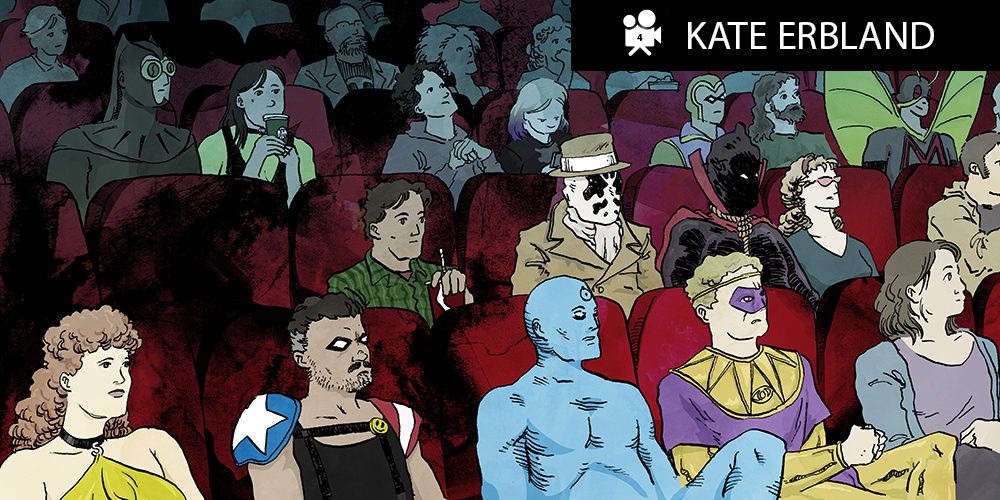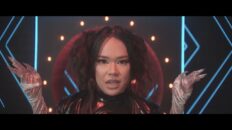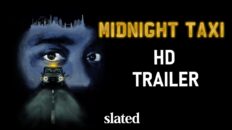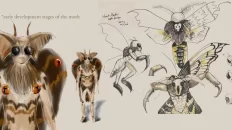Illustration by Seth T. Hahne
Our film critic interview series, Who Watches the Watchmen?, continues with a conversation with Kate Erbland, who works as the Film Editor at IndieWire. Before landing that position, where she continues to regularly write as well, Kate contributed to a number of high profile publications including Film School Rejects, Vanity Fair, Cosmopolitan and Rolling Stone. She has been featured in multiple female film critics to watch lists.
RUD: Hello Kate. Thank you for letting us ask you a few questions. You have an impressive body of work including contributions to Film School Rejects, Vanity Fair, Cosmopolitan, Rolling Stone, ScreenCrush, and others. Can you tell us a little about what got you started in the industry? And how did you catch the film critic bug in the first place?
Erbland: I was one of those kids who grew up in a household where the concept of “inappropriate entertainment” for kids just didn’t exist, and my parents pretty much let me watch whatever I wanted – movies and television–from maybe too young of an age. This is perhaps why I was the only fourth-grader who would tell people that Pretty Woman was their favorite film (and it was true! Plus Dirty Dancing and the Thornbirds miniseries!), but I’d like to think it all worked out. I managed to see a wide variety of things from a young age and hone in my movies taste that way, and I am grateful my parents gave me that freedom. I also grew up loving to write, and when I went to college, my (again, very open-minded) parents let me major in English, with an emphasis in writing.
My background is in journalism–I ran my high school paper my senior year, still the best training I’ve ever received–and I can’t say that I had some passionate desire to be a film critic right off the bat. But I always loved movies and I always loved writing, so when I started noodling around on blogs after I graduated, it kind of seemed like the most natural extension of those two obsessions.
I was lucky that I started writing for small film blogs when they were more prevalent (and always looking for more help, even from people who had zero background in film writing but were eager to learn), and attending festivals (which I did on my own dime, on my own vacation from my post-college day job) helped to introduce me to lots of people in the industry. Those people became friends, and many of them were also editors who offered me assignments and an open space for pitching that allowed me to make the jump to full-time freelancing. It was a lot of hustling, but I always like to remember that it sprang from a place of “hey, this might be fun.”
RUD: You are currently the Film Editor at IndieWire. Can you tell us a little about that position? How did that come about?
Erbland: I’ve been at IndieWire for a little over three years. Before that, I was full-time freelancing for about two years, including steady work at Rolling Stone, Vanity Fair, Cosmopolitan, and The Dissolve (RIP), where I did a little bit of everything–interviews, reviews, features, lists, news–for a whole bunch of different editors–still the second best training I’ve ever received–when I was approached about an open position. The fun answer is, my name was out there and they came to me. The real answer is, I worked my butt off to make sure I had a resume and clips that spoke to my interest and ability to do all kinds of stuff.
IndieWire was a lot smaller back then, but even as we’ve grown (our editiorial staff nearly doubled in my first two years!), the need to be hands on and kind of scrappy and to move easily between writing and editing is key. I love that stuff. My day-to-day speaks to that, and I both write and edit (a rarity when it comes to the “editor” title) on a daily basis. I also continue to do a little bit of everything (though I am mostly busy with interviews and reported features), and I get to flex my latent desire for organization when it comes to large-scale planning endeavors, from festival coverage to preview packages.
RUD: There are so many film news sources. What makes IndieWire special?
Erbland: IndieWire has always been on the cutting edge of indie film–before there was a website, IW was a daily handout at Sundance, literally written the day before and distributed via Xeroxed copy to whoever wanted one–but as some of indie film’s luminaries have ascended to the higher reaches of Hollywood, we’ve been able to continue covering them (and their work) that way. On first glance, it might look weird that a site called “IndieWire” writes about the latest Avengers movie, but those movies are made by a pair of guys who debuted their first film at Slamdance after charging pretty much their entire production to credit cards. That’s an IndieWire story, and that’s the kind of knowledge and experience we use to discuss every facet of the industry, not just the indie stuff (in short, a lot of the good stuff is right from the indie pool, and we’ve been there from the start).
RUD: You haven’t shied away from calling out Hollywood’s lack of diversity, especially regarding women in the director’s chair. Why is this important?
Erbland: There’s many reasons why this is so important to me, and why it should be so important to anyone who cares about the way art and entertainment are crafted. First, representation matters. If you don’t see yourself in a world, it’s hard to imagine yourself there. Second, the idea that something as massive and influential as movies should all spring from the same place–often white, male, and straight–is insanity. The world is a big place, and it’s filled with all kinds of people and stories and viewpoints, all of which are just as valid and necessary for the big (and small!) screen.
And, to be clear, nothing changes without a lot of talk, a lot of pushing, and a lot of reminders of how and why things should be different. That’s why I get so outspoken about those things, I am happy to lend my voice and opinion in any way that can be useful.
RUD: Have you been pleased with recent female directed films? Are there any standouts you would recommend for a must-see list?
Erbland: I have been! I have especially been inspired by the wide range of female-directed films coming out of the studio side, which has for so long marginalized female directors. Of recent note, Kay Cannon’s Blockers is incredibly funny, sex-positive, and focused on the power of friendship; I am also one of those people who went nuts for Netflix’s charming rom-com Set It Up, directed by Claire Scanlon. On the festival side–and coming out soon!–there are some real gems to be found amongst Desiree Akhavan’s The Miseducation of Cameron Post, Josephine Decker’s Madeline’s Madeline, and Jordana Spiro’s Night Comes On, all of which debuted at Sundance earlier this year.
RUD: If you could wave a magic wand and change one thing about the film criticism and writing industry, what would it be?
Erbland: Two words: MORE DIVERSITY.
RUD: As a film critic, readers get to hear your thoughts on film. But how are your thoughts shaped? Do you think films are a positive influence on the world?
Erbland: I like to sit with films before I write about them, take a little time to think about what really stood out for me–both good and bad–and what I think is most important to convey to readers, who I always like to imagine are curious, adventurous, and willing to see anything that someone else can passionately champion. Writing-wise, I’m still old school: I do an outline, and I write from there. I don’t get bogged down in the order of things, sometimes a final paragraph comes first, sometimes I just go ahead and write about a particular element and stick it in where it fits.
I think all art is a positive influence on the world, even the art that is “upsetting” or “problematic,” because it forces people to explore deeper emotions and to reckon with tough questions. That can be hard, but the work is worth it.
RUD: Do you think the universe is a benevolent place or an uncaring place? How does art, and film in particular, relate to your view of existence?
Erbland: Okay, that’s a tough one. I would like to think it’s benevolent. And, as I said before, I think that art is a positive influence on the world, one that can help people sort through emotions, thoughts, and beliefs in a different way.
RUD: Is there one film, not necessarily your favorite, that you are always excited to show someone the first time?
Erbland: I’m packing one special standby: Nash Edgerton’s wicked 2007 short Spider. It’s the perfect film to show someone as a way of getting to know their sense of humor (and, to be honest, their stomach, this little guy gets brutal) and if it matches up with mine. It’s wickedly funny, razor sharp, and incredibly well-made. I take a lot of pleasure in showing it to people and then spending its running time just watching them for reactions.
RUD: Are there any current film critics you make sure to read? And what do you think makes them worth reading?
Erbland: I love reading Manohla Dargis, Richard Brody, Amy Nicholson, Alison Wilmore, IndieWire’s own Eric Kohn and David Ehrlich (I’m biased!), and any time the great Molly Haskell comes out of semi-retirement with a new piece. More than anything, I love reading great writing, even if I don’t necessarily agree with the critical take. In that same vein, while she doesn’t do reviews anymore, I always loved reading Michelle Orange. We didn’t often agree on films, but her writing is a total joy to read and it’s always a pleasure to have your own critical thoughts challenged by a writer with that much skill. I also miss Karina Longworth’s reviews, but her podcast You Must Remember This is aces.








